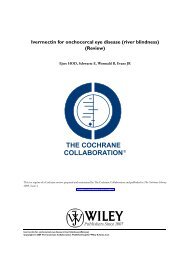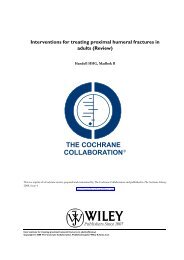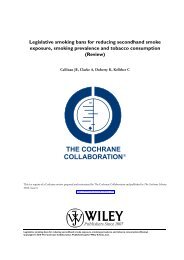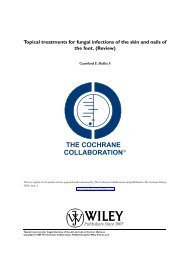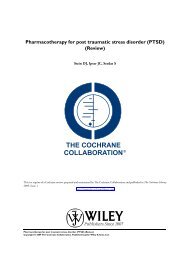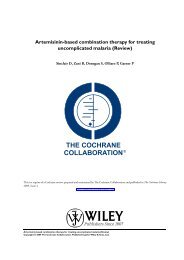Antiamoebic drugs for treating amoebic colitis - The Cochrane Library
Antiamoebic drugs for treating amoebic colitis - The Cochrane Library
Antiamoebic drugs for treating amoebic colitis - The Cochrane Library
You also want an ePaper? Increase the reach of your titles
YUMPU automatically turns print PDFs into web optimized ePapers that Google loves.
Figure 2. Alternative drug vs metronidazole: parasitological failure 15 to 60 days after end of treatment.<br />
No data on relapse were reported.<br />
Adverse events were incompletely reported. <strong>The</strong>re were no serious<br />
adverse events or adverse events that necessitated drug withdrawal<br />
in the three trials that reported on this (Joshi 1975; Mathur 1976;<br />
Awal 1979). For the other adverse events, they were more common<br />
in those given metronidazole compared to those given tinidazole<br />
(RR 0.65, 95% CI 0.46 to 0.92; 477 participants, 8 trials, Analysis<br />
1.6). <strong>The</strong> most common adverse events reported were nausea,<br />
vomiting, decreased appetite, altered taste or metallic taste, and<br />
abdominal discom<strong>for</strong>t (see Appendix 11 <strong>for</strong> other details).<br />
1.2. Other <strong>drugs</strong> versus metronidazole<br />
Other alternative <strong>drugs</strong> tested were ornidazole (128 participants, 3<br />
trials), panidazole (44 participants, 1 trial), and satranidazole (40<br />
participants, 1 trial). <strong>The</strong> number of trials was too small to detect<br />
any difference in clinical failure or parasitological failure compared<br />
<strong>Anti<strong>amoebic</strong></strong> <strong>drugs</strong> <strong>for</strong> <strong>treating</strong> <strong>amoebic</strong> <strong>colitis</strong> (Review)<br />
Copyright © 2009 <strong>The</strong> <strong>Cochrane</strong> Collaboration. Published by John Wiley & Sons, Ltd.<br />
with metronidazole (Analysis 1.1, Analysis 1.2, Analysis 1.3, and<br />
Analysis 1.4).<br />
For relapse, data were reported <strong>for</strong> two trials, and both compared<br />
ornidazole with metronidazole. <strong>The</strong>re were more relapses in those<br />
given ornidazole compared with metronidazole (RR 4.74, 95% CI<br />
1.07 to 20.99; 135 participants, 2 trials, Analysis 1.5), but there<br />
were insufficient data to draw definite conclusions.<br />
<strong>The</strong>re were no serious adverse events or withdrawals resulting from<br />
adverse events in two trials that reported on this (Pehrson 1984;<br />
Tripathi 1986). One participant given ornidazole developed a temporary<br />
numbness of the hands and tongue with difficulty of speaking<br />
that disappeared after stopping treatment (Botero 1974). In<br />
another trial (Naoemar 1973), the daily dosage of ornidazole had<br />
to be reduced from 1500 mg to 1000 mg in two participants each<br />
in the ornidazole group and metronidazole group because of dizzi-<br />
13



